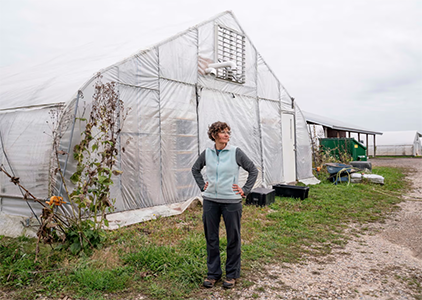||| FROM THE GUARDIAN ||| POSTED AT REQUEST OF ORCASONIAN READER
Floods, freezes and heatwaves threaten seed production as farmers scramble to produce strains that resist climate chaos
Once upon a not-so-distant time, the growing season for the Ann Arbor, Michigan-based Green Things Farm Collective followed a steadfast trajectory.

“We reliably had rainy springs and early summers, then hot and dry in late July and August, with the rains picking up again in September,” said Stacy Mates, Green Things’ seed company manager. “For a crop like lettuce seed, it was perfect.”
Within this decade, Mates has noticed that the previously familiar cycle “has changed dramatically. What we’ve gotten the last three years is drought in June and then torrential rains in July and August,” causing complete lettuce seed crop failures two years running. This year, after golf ball-sized hail, numerous severe thunderstorms and 75mph winds, a first crop of seed never matured. Mates treated a second crop with kid gloves, trellising the plants and covering them with shade cloth in hopes they’d survive another deluge. By late September, Mates had managed a solid harvest, with enough seed to sell.
Farmers are already fighting many battles in a growing season: beating back powdery mildew on cucumbers, hornworms devouring tomato leaves and strawberries plagued by verticillium rot. But for the farmers who grow the seeds that wind up in our seed packets and undergird our horticultural adventures, production has become ever more difficult.
So difficult, in fact, that Green Things recently decided it would call it quits on growing for seeds. Mates can’t say for certain just how much climate change is to blame for production challenges, only that its role is undeniable.
“We are not having normal seasons any more”, said Lane Selman, an agricultural researcher at Oregon State University and founder of a seed-producer community called the Culinary Breeding Network. As the northern hemisphere shakes off its hottest summer on record, intensifying weather events threaten the variety we take for granted when we page through winter-delivered seed catalogues, dreaming of a bountiful spring.
“Every seed company is facing these problems, but they probably wouldn’t want to tell you that,” said Alan Sparks, an industry veteran who consults for Baker Creek Seeds. “‘We’ve got everything in control! Everything’s gonna be OK!’ But it’s not OK.”
**If you are reading theOrcasonian for free, thank your fellow islanders. If you would like to support theOrcasonian CLICK HERE to set your modestly-priced, voluntary subscription. Otherwise, no worries; we’re happy to share with you.**








